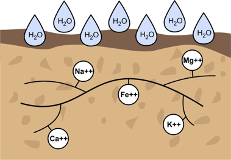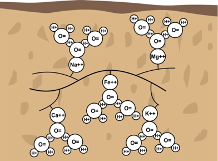What are Chemical treatments?
The largest group of plant infection, diseases, and crop loss are caused by pathogens such as fungi, viruses, etc and by weeds, pests’ attack. Chemical treatments: a method of agriculture disease management using different chemicals. Chemical treatments act on these diseases causing pathogens and are widely applied in agriculture to control the disease and improve the growth and yield of crops (Pujol et al., 2006). Chemical treatments are formulations of chemicals such as streptomycin sulfate, oxy- tetracycline, atrazine, chlordane, endosulfan, DDT, aldrin, 2,4-Dichlorophenoxyacetic Acid (2,4-D), copper, sulfur, etc., which are toxic, pose risks to people and perform bactericides, insecticides, and fungicides action on pests and pathogens.
Global Market of Chemical treatments
Chemical treatment is the most effective method of control till date (Zhao et al., 2017), having a global market of USD $104.9 billion in 2018 with a growth rate of +3.7% per year to reach $121.3 billion by 2022 (Business Research, 2019).
Advantages (Pros) of Chemical treatments
Advantages of chemical treatments across plant disease management are many, use and application is very easy and robust, covering large fields in less time, selective products depending upon the stages of growth. Production of these chemical agents can be carried out at large scale in minimum time, custom-made depending upon the plant growth and soil filed parameters, commercially available, and the regulatory registration process with agencies is straightforward.
Disadvantages (Cons) of Chemical treatments
These reasons encourage the application of chemical treatment worldwide; however, continuous, and long-term application of chemical agents leads to accumulations in soil and elevates the chemical resistance of plant pathogens (Zhao et al., 2017). In addition, the residues of chemical treatment have greater influence on the ecological system, soil fertility reduction, underground water contamination, affecting animals, and birds, promoting to seriously environment pollution (Gao et al., 2012). To add-on, chemical fungicides and insecticides are expensive, hazardous, progressively discouraged, deliver damaging and negative impact on beneficial soil microorganisms present that support to increase plant growth (Hashem et al., 2019).
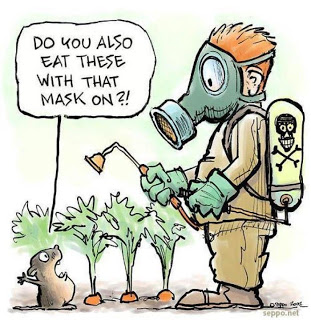
Search for Alternate Treatments
On the other hand, increasing demand to reduce the use of chemicals, low-input, low-cost, sustainable products, minimize environmental degradation, restoration of habitat, to preserve the ecosystem has resulted in greater interest and has become a focal point of research (Pozo et al., 2013). Alternative methods like biological control using microorganisms are getting encouraged, popular and progressively applied.
What are Biological treatments?
Biological treatments: a method of agriculture disease management using microbes. The biological interventions with the manipulation and use of native, beneficial soil microorganisms is recognized as a sustainable, non-hazardous, and eco-friendly strategy in agriculture application (Pujol et al., 2006). Application of microorganisms (fungi and bacteria) is also considered as organic farming carried out to increase productivity and disease resistance in crops in modern agriculture. Use of beneficial microbes, such as species of Arbuscular Mycoorhizal Fungi (AMF), Trichoderma, Bacillus subtilis, Pseudomonas fluorescens etc. promote positive impact on the host plant to increase biomass, growth upgrade, higher crop yield, improve nutrient efficiency, increase soil fertility, overcome biotic and abiotic stress conditions, minimize heavy-metal toxicity, promote disease resistance genes, and stimulate to synthesis wide range of antibodies and antimicrobial metabolite. These benefits could augment and terminate the use of chemical pesticides in future (Hashem et al., 2019).
Global Market of Biological treatments
Significant success of using biological control in plant health and disease management was carried out in 20th century and with advancement in modern biotechnology is predicted to be even more significant in the 21st century (Gao et al., 2012). Currently, the global markets of biopesticides exceeded USD $3 billion in 2018, several companies worldwide are producing different products, predicted to grow at the rate of 15% per year and is growing at large scale especially in North America and Europe (Global market Insights, 2019).
Advantages (Pros) of Biological treatments
The application of biological control on different variety of seeds, plants and crop delivered increased root and shoot biomass, promoted defense systems against various diseases, increased the soil fertility, developed resistance to stress and drought conditions, and delivered significant higher yields. Under controlled-environment conditions, the mode of action and efficacy of microbial control overrides the chemical fungicides, with reduction in disease (Root rot, Clubroot, Sclerotinia stem rot, Blackleg, Verticillium wilt etc.) severity of more than 80% relative to pathogen inoculated controls (Debao et al., 1993) (Cheah et al., 2000) (Hanson et al., 2000) (Strelkov et al., 2011). Cultivation of crops in contaminated fields or heavy metals concentrated soil was only possible with use of biological control. Use of biological control have a clear edge over chemical treatment in agricultural management.
Disadvantages (Cons) of Biological treatments
However, several challenges are hindering the advancement and popularity of biological control from a scientific model to a viable commercial product. Few of the technical challenges such as major obstacle for massive inoculum productions, culturing obligate symbionts require host plants (Pozo et al., 2013), time consuming, inability to produce resting spores, quality consistence, formulation complications for commercial use (Weller et al., 2007). The antibiotic-producing biocontrol agent used in the treatment of plants, get transferred and when consumed by human and animal develop pathogen resistance against these antibiotics (Panpatte et al., 2016). The potential benefits of biological control are affected by crop management factors such as crop rotation, tillage practices and seeding equipment etc. In addition, nontechnical challenges such as registration process with regulatory agencies, approval of federal USEPA and authorization of agencies within each state is necessary requirement (Stockwell et al., 2007) (Panpatte et al., 2016).
Comparison across Chemical and Biological treatment
Till now, agriculture disease management rely mainly on the application of chemical treatment due to efficient strategy, cost-effective, availability, easy application, however chemical treatment poses serious risks to human health and environment. Therefore, biological treatment overcomes these issues for non-toxic, human and environment friendly, low-cost, however biological formulation production and effect is time consuming, and many companies’ products are under stage of approval for worldwide applications. Table 1, compares the key features across chemical and biological treatment and Figure 1, represents the comparison of chemical and biological treatment on an infected plant.
Table 1: Key features comparison across chemical and biological treatment (Biological and Chemical, 2018).
| Key features | Chemical treatment | Biological treatment |
| Raw material | Non-renewable, costly chemicals | Renewable, low-cost biomass |
| Catalyst | Metals and oxides | Microbes and enzymes |
| Operating condition | 750 °F and 200-600 atm pressure | Ambient temp and pressure |
| Energy input | 650-1000 kJ/mol NH4 | 200-350 kJ/mol NH4 |
| Production rate | Quick | Time consuming |
| Efficiency | 50-70% | 80-90% |
| Effect | Rapid | Slow |
| Cost | Marginal cost | Low cost |
| Products | Many | Few |
| Soil health | Deteriorates and degrades | Improves and benefits |
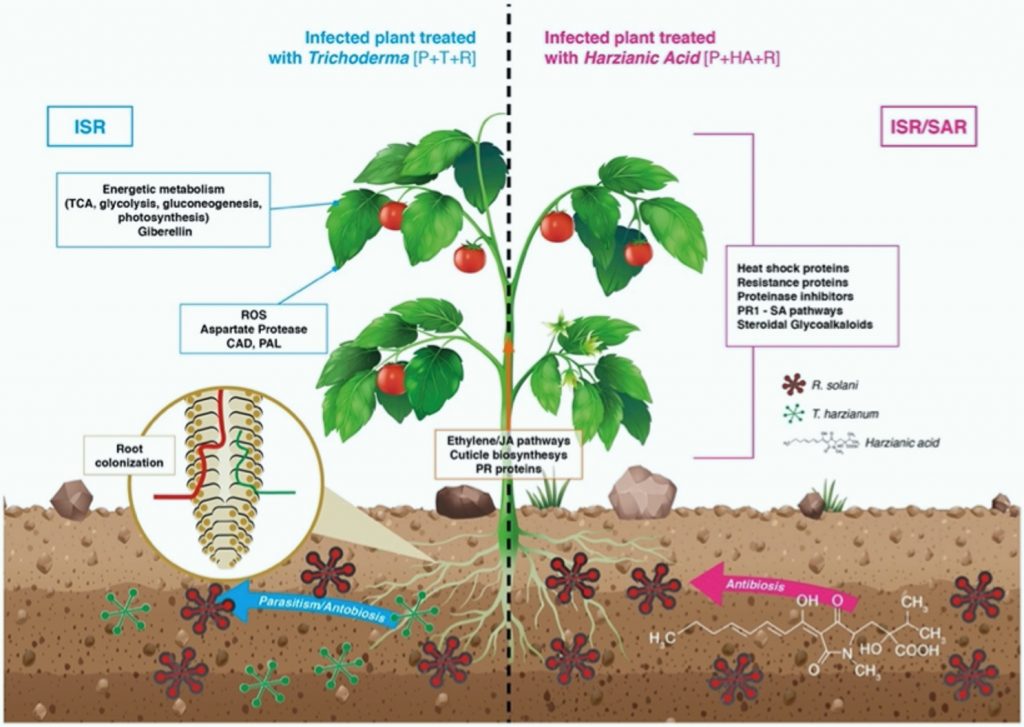
Balanced approach
A balanced approach of using biological and chemical treatment needs to be carried out to have a significant result in the plant health and disease management for improved and higher agriculture yield. This approach will deliver multidimensional advantages/benefits of both biological and chemical treatment and comes together with a better formulation choice to be exploited in the field of agriculture with economical and environmental benefits.
References:
- Zhao, L., Feng, C., Wu, K., Chen, W., Chen, Y., Hao, X., & Wu, Y. (2017). Advances and prospects in biogenic substances against plant virus: A review. Pesticide biochemistry and physiology, 135, 15-26.
- Business Research 2019. https://www.thebusinessresearchcompany.com/report/chemical-fertilizers-market
- Pujol, M., Badosa, E., Manceau, C., & Montesinos, E. (2006). Assessment of the environmental fate of the biological control agent of fire blight, Pseudomonas fluorescens EPS62e, on apple by culture and real-time PCR methods. Applied and Environmental Microbiology, 72(4), 2421-2427.
- Hashem, A., Tabassum, B., & Abd_Allah, E. F. (2019). Bacillus subtilis: A plant-growth promoting rhizobacterium that also impacts biotic stress. Saudi journal of biological sciences, 26(6), 1291-1297.
- Gao, G., Yin, D., Chen, S., Xia, F., Yang, J., Li, Q., & Wang, W. (2012). Effect of biocontrol agent Pseudomonas fluorescens 2P24 on soil fungal community in cucumber rhizosphere using T-RFLP and DGGE. PloS one, 7(2), e31806.
- Pozo, M. J., Jung, S. C., Martínez-Medina, A., López-Ráez, J. A., Azcón-Aguilar, C., & Barea, J. M. (2013). Root allies: arbuscular mycorrhizal fungi help plants to cope with biotic stresses. In Symbiotic endophytes (pp. 289-307). Springer, Berlin, Heidelberg.
- Debao, X. T. Z. J. L. (1993). ANTAGONISM OF TRICHODERMA HARZIANUM T82 AND TRICHODERMA SP NF9 AGAINST SOIL-BORNE FUNGOUS PATHOGENS [J]. Acta Phytopathologica Sinica, 1.
- Cheah, L. H., Veerakone, S., & Kent, G. (2000). Biological control of clubroot on cauliflower with Trichoderma and Streptomyces spp. New Zealand Plant Protection, 53, 18-21.
- Hanson, L. E. (2000). Reduction of Verticillium wilt symptoms in cotton following seed treatment with Trichoderma virens.link: https://pubag.nal.usda.gov/catalog/30124
- Strelkov, S. E., Hwang, S. F., Howard, R. J., Hartman, M., & Turkington, T. K. (2011). Progress towards the sustainable risk management of clubroot (Plasmodiophora brassicae) of canola on the Canadian prairies. https://doi.org/10.7939/r3-vxq6-js48
- Manganiello, G., Sacco, A., Ercolano, M. R., Vinale, F., Lanzuise, S., Pascale, A., … & Woo, S. L. (2018). Modulation of tomato response to Rhizoctonia solani by Trichoderma harzianum and its secondary metabolite harzianic acid. Frontiers in microbiology, 9, 1966.
- Global market Insights, 2019. https://www.gminsights.com/industry-analysis/biocontrol-agents-market.
- Weller, D. M. (2007). Pseudomonas biocontrol agents of soilborne pathogens: looking back over 30 years. Phytopathology, 97(2), 250-256.
- Panpatte, D. G., Jhala, Y. K., Shelat, H. N., & Vyas, R. V. (2016). Pseudomonas fluorescens: a promising biocontrol agent and PGPR for sustainable agriculture. In Microbial inoculants in sustainable agricultural productivity (pp. 257-270). Springer, New Delhi.
- Stockwell, V. O., & Stack, J. P. (2007). Using Pseudomonas spp. for integrated biological control. Phytopathology, 97(2), 244-249.
- (Biological and Chemical, 2018) https://www.differencebetween.com/difference-between-biological-control-and-chemical-control/
About Author: VINAYAK PACHAPUR, PhD

A balanced approach of using biological and chemical treatment will deliver multidimensional advantages/benefits of both biological and chemical treatment and comes together with a better formulation choice to have a significant result in the plant health and disease management for improved and higher agriculture yield. To support this approach, Vinayak and CAI team embarked on developing bio-based formulations to boost the consortia between plant and beneficial microbes for better agriculture disease management and providing a sustainable tool for higher crop yields.
What Are Humic Substances?
Plants at the end of the life cycle get decomposed in the presence of microorganisms and with the help of mineralization tend to return to soil in the form of organic matter. These large organic carbon-chain complexes composed of carbon, oxygen, hydrogen, nitrogen, and sulfur, contributing towards the brown or black color of soil surface, are known as humic substances. These humic substances are divided into three categories (Humin, Humic acids (HAs), and Fulvic acids (FAs)) depending upon the molecular size and solubility in water (Copper, 2017).
What are Humins?
Humic acids are very large molecules (molecular weight: 100,000 to 10,000,000 Da), not soluble in water at any pH level and are very slow to break down. In soil, humins functions as cation exchange system to improve soil structure, stability for water holding capacity and ability to store plant nutrients (Copper, 2017).
What are Humic Acids?
Humic acids are natural organic polymeric compounds: mixture of 35% of aromatic (carbon rings) and 75% of aliphatic (carbon chains) organic acids. These organic acids are around (molecular weight: 50,000 to 100,000 Da), water soluble under alkaline condition but are usually insoluble in acidic conditions (Petit, 2004). Humic acid are also called bio-stimulants and are most important component of soil humus (Malik et al., 2020) (Saadati et al., 2014). Humic acid are vital component of humic substance, produced by chemical and biological decomposition of organic material with help of micronutrients (Kandil et al., 2013).
What are Fulvic Acids?
Fulvic acids (FAs) are mixture of weak aromatic (carbon rings) and aliphatic (carbon chains) organic acids. These organic acids are around (molecular weight: 5,000 to 10,000 Da), soluble in water at acidic, neutral, and alkaline pH; are 10 times smaller, chemically more reactive due oxygen contents, and exchange capacity is 2-times in comparison to humic acids (Petit, 2004). Due to smaller in size, fulvic acid carries trace minerals from plant surfaces and easily enters plant leaves, stems, and roots. Fulvic acid are most effective chelating compounds, and key ingredients of high-quality foliar fertilizers (Petit, 2004). Fulvic acids are anti-transpirations among organic acids, non-toxic, low-cost, pollution-free with no effect on environment even after repetitive and extensive use over the years (Moradi et al., 2017).
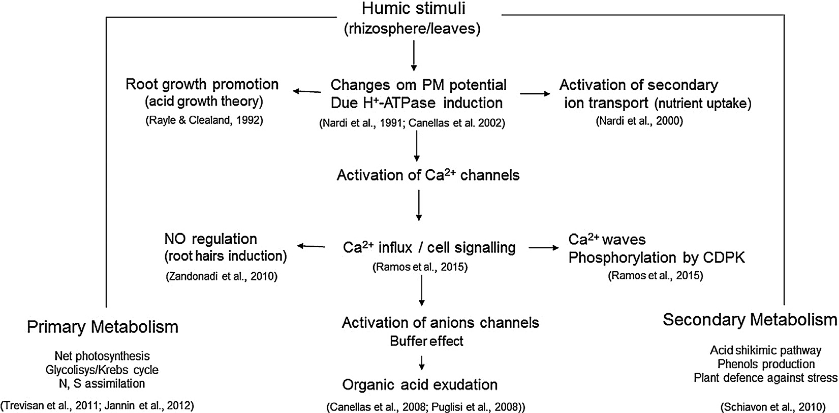
General Benefits of Humic substance
Humic substance are responsible for the biodegradation of several substances and formation of organic acids that are beneficial for soil health. Humic acid are the main component of organic fertilizers, which improves soil fertility, and augments characteristics of soil (permeability, aeration, aggregation, water holding capacity, ion transport, and pH buffering) (Kandil et al., 2013) as represented in Figure 1. Humic substance improves soil health, increases absorption level of plant food elements/nutrients, improves mineral nutrient conversion with higher accessibility, and boosts quality of crop products as represented in Figure 1. In addition, humic substance initiates plants activity by meiosis, enhances root growth speed as represented in Figure 2, increases dry materials performance, accelerates seed generation, increases vitamin level, elevates plant membrane permeability (Saadati et al., 2014) and are effectively utilized across horticulture and cereal crops (Malik et al., 2020).
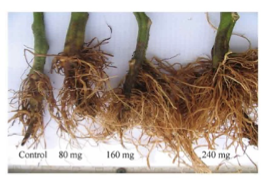
General Benefits of Fulvic acid
Fulvic acid easily penetrates through cell membrane, helps in easier transportation, and absorption of nutrients. Fulvic acid as bio-stimulants help to stimulate crop physiology and biochemistry (carotenoids and chlorophyll), increases antioxidant potential, higher root growth, enhances nutrient use efficiency (NUE) resulting into reduced fertilizer utilization (Malik et al., 2020). Fulvic acid are non-toxic mineral chelating additive and are water binders attracting water molecules to maintain soil moisture (Moradi et al., 2017).
Benefits across Soil Amendment
Fulvic and Humic acids have a high cation exchange capacity (CEC) to store several positively charged minerals like Fe+, Na+, Mn+, Mg+, Ca+, K+ etc, and increases the amount of minerals in the soil. These effects alter the soil’s organic matter overtime that ultimately leads to soil and crop health sustainability. The increased amount and presence of Fe and Zn in the soil promotes chlorophyll content resulting in healthy plant growth (Suh et al., 2014) (Capstaff et al., 2020).
Benefits as Soil Conditioners
Humic and Fulvic acids act as soil conditioners because of their high molecular weight and are essential for both soil and soil-less substrates with either transformation or supplementation property. The quality and efficacy of either dirt or soil-less media can be greatly increased by improving water retention by facilitating the movement of nutrients between soil particles, increasing the availability and even distribution of fertilizer in the soil (Moradi et al., 2017).
Benefits as Chelating Agent
Humic and fulvic acids form chelates by attaching themselves with micronutrients (Fe+, Na+, Mn+, Mg+, and Ca+), promotes high ion-exchange and buffering capabilities, forming a composite that is easily and efficiently absorbed by crops. The protective activity of humic acids leads to adequate amounts of co-factors around the roots which contributes to an increase in both plant matter and root mass, including the formation of horizontal or lateral roots across hydroponic, biological (soil), and aeroponic gardening setups (Moradi et al., 2017) (Capstaff et al., 2020).
Benefit Mechanisms during Clay Compaction
During the clay compaction, when the amount of clay in the soil is high, and particularly at extreme concentration of salt, the positive charge on the corners of a clay molecule joins with the negative charge of another on the soil level surface, shaping a tight three-dimensional structure as represented in Figure 3 (A). Humic acid encourages the penetration of water into compacted clay and soil structure. As humic acid infiltrates compacted clay platelets, it isolates salts and expels them from the dirt molecules. This restores a negative charge and helps in repulsion and segregation; resulting in saline soils (Li et al., 2019) as represented in Figure 3 (B).
Micronutrient Transfer
Humic acid with the property of high ion-exchange and buffering capabilities, picks up positive ions of micronutrients, which are taken-up by a plant’s root (root’s negative charge is greater than humic acid’s negative charge) and absorbed into plant’s circulation system (Suh et al., 2014) as represented in Figure 3(C).
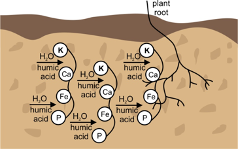
Water Sequestration
Humic acids moderates water dissipation from soils particularly where the clay is not present or in a low focus, in bone-dry regions, and in sandy soils without the capacity to hold water. Humic acids hold cations in a way they can be more effortlessly consumed by a plant’s root, enhancing micronutrient transfer to the plant’s dissemination framework (Moradi et al., 2017). Ionized nutrients present on the plant roots are bond to water. Cations near water are halfway ionized and move a short separation far from the humic acid destinations on the root as represented in Figure 3 (D). The water sequestration movement restores the ion’s positive attractive force, permitting the oxygen end of water atoms to freely cling to the cation. Evaporation decreases when the oxygen end of water molecule bonds with positive charge minerals and oxygen molecule of another water molecule bonds with the hydrogen end. This mechanism reduces almost 30% of evaporation and helps in water retention and ultimately soil conditioning in water drought conditions (Suh et al., 2014) as represented in Figure 3 (E).
Mode of action
The soil application of the humic and fulvic acid results into the direct root uptake, by passive and metabolically active ways. In case of humic acid, due to high molecular weight the action is carried out by root with primarily passive; in case of fulvic acid due to smaller molecular weight is done by primarily metabolic way. Once these acids reach a higher concentration level in the roots, a certain fraction (5-30%) of the total acid concentration is moved into other parts of plant such as shoots and leaves. Increased concentrations of these acids are observed in plant cell walls and cellular organelles such as mitochondria and ribosomes. These acids effects both hydrophilic and hydrophobic sites on plant cell membrane, increase the permeability of mineral elements and nutrients at the sites of metabolic need. The application of these acids on plant leaf’s helps to increase the chlorophyll content and correlates towards the increased uptake of oxygen. This reaction further increases the messenger Ribonucleic acids (mRNA) to trigger the activation of several enzymes necessary for different biochemical processes within plant cells (Petit, 2004). These acids provide free radicals to plant cells, have “active sites” on the surface of polymer with functions as electron donors. These free radicals have one or more free electrons ready for pairing, highly active, short shelf life and capable of exerting many positive reactions to participate in seed germination, root initiation and plant growth (Petit, 2004) (Suh et al., 2014).
How can Humic and Fulvic acid help my crops?
Humic acid acts in two different ways on plant nutrition. In case of indirect effect, humic acid improves soil physical features, balances the availability of minerals for absorption to roots, and improves water holding, drainage and ventilation system. Directly humic acid effects development of root, on plant element metabolism, additional fertilization causing prominent characteristics and mechanisms of plant yield (Kahraman et al., 2020). In short, humic acid in case of cellular mechanism: stimulate proton pumping, promotes ATPase activity for cell elongation and cell wall loosening, for physiological mechanism: enhanced accumulation of root biomass, for agriculture benefits: increased minerals nutrient efficiency and root foraging ability (Malik et al., 2020). The effect of humic acid improved dry weight of root system, incremented differentiation of adventitious root into storage root and further increased root morphology (length, diameter, and volume) (Chen et al., 2017).
Relief from Environmental Stress
In case of salt stressed conditions under indirect actions humic acid improves physio-chemical and microbiological soil properties and directly activates physiological, biochemical and hormone producing activities. During amelioration salinity stress condition, humic acid adjusts osmotic role by balancing water transport and cell turgor, triggers antioxidant enzymes, scavenging reactive oxygen species (ROS), increases endogenous proline levels and reduces membrane leakage to adapt to stress conditions (Ashour et al., 2008). Foliar application of humic acid favored the improvements in vegetative traits (chlorophylls and carbohydrates) and chemical compositions (K+ %, Ca2+ % and K+/Na+ ratio) with decrease in accumulation of total phenolic, Na+ and Cl− % toxic ions in leaves of plant investigated under salinity stress conditions (Ashour et al., 2008).
Improved Nutrient efficiency
Humic substances regulates or buffer the soil pH, making the soil less acidic and less alkaline to drive-in the accessibility of trace elements and nutrients bound in soil due to acidic or alkaline conditions (Copper, 2017). Humic substances stimulates structural and physiological changes in roots and shoots for nutrient efficiency traits (uptake, assimilation, and distribution), induce shifts in plant metabolism for abiotic stress tolerance and plant growth fitness (Canellas et al., 2015).
Biotic and Abiotic conditions
Presence of humic substances in soil results in electrical attraction of small soil particles to form crumb structure in topsoil, these open spaces help in exchange of gas with atmosphere, improve water infiltration with higher water-holding capacity and protect plants in drought conditions. Humic substances represents insulating property to stabilize soil temperature, decrease the rate of water evaporation, resulting in additional protection during climate change (Copper, 2017) and during induced stress conditions as represented in Figure 4. Application of fulvic acid decreased the water stress during hot and dry winds throughout the year, growth stimulation led to water loss reduction, and balances plant growth during watered and drought conditions (Moradi et al., 2017).

Plant disease management
Energy in the form of carbon bonds in humic substances act like food source for soil microorganisms to perform different functions (mineral solubilization, releasing antibiotics against pests) to contribute towards soil and plant health. Humic substances regulate, balance, stabilize or inactivate soil enzymes and degrade or nullify the toxins released by plant pathogens, pests, and pesticides (Copper, 2017). Use of fulvic acid improved the resistance of grape towards white rot disease (Moradi et al., 2017), reduced occurrence of blossom-end rot disease in tomato (Suh et al., 2014), and application of humic acid on tomato showed increment in root fresh weight and increased resistance to root rot pathogens (Yigit et al., 2008).
Should I inoculate my crops with Humic and Fulvic acid?
Due to several benefits and advantages of these acids, across the world farmers concluded to include humic acid as inseparable and integral part of crop fertilization program and soil fertility. The application of humic acid is more effective on plant root in comparison to aerial part of plants, it increases root volume and improves the function of root system (Saadati et al., 2014). Humic and fulvic acids are considered superior and economic treatment in comparison to other nutrient or biostimulators treatment and is suggested to overcome the adverse impact of salinity stress on plants (Ashour et al., 2008) as represented in Figure 5. Humic and fulvic acids have gained attention over the past two decades, are specially considered within the limits of European Union (EU) regulations for agricultural practices. Use of Humic and fulvic acids minimize and maintain the use of fertilizers, without affecting the quality and yield of crops (Malik et al., 2020).
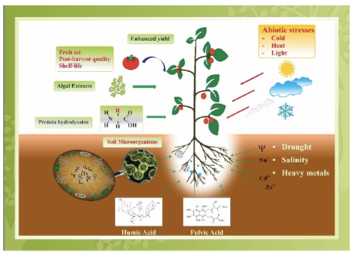
Increased crop yield
In case of green bean, the application of humic acid improved the germination growth such as leaf, branch, pods quality yield (length and weight) and chlorophyll (a and b) content, plant weight and height, in comparison to plants without humic acid treatment (Saadati et al., 2014) (Rasaei et al., 2013). In case of tobacco and medical herbs increased the accumulation of alkaloids in leaves, increased the transfer of glucose to further increase the carbohydrate content in potato, sugarcane, carrot, and tomato (Saadati et al., 2014) (Tan, 2014). In dry-farming land conditions for chickpea, humic acid improved the weight of seed by 5% of harvest index, on spices plants increased the absorption of minerals and nutrients, and significantly increased the oil content in mustard plant (Saadati et al., 2014). In case of legumes, application of humic acid (9 kg/da) delivered highest values for protein ratio (20.56-25.89%) and protein yield (39.77-63.56 kg/da) in comparison to control test (Kahraman et al., 2020). Application of humic substances delivered higher yield in case of vegetables (apricot: 16 to 33%, broccoli: 15%, beans: 25-45%, eggplant: 23-65%, okra: 76%, potato: 11-22%), fruit crops (grape:2-6%, muskmelon:18%, strawberry: 33%), and ornamental plants (Calathea insignis Hort: 45-89%) (Canellas et al., 2015). Direct application of fulvic acid increased the growth of Rhizobium and confirmed evidence of up-regulation of many specific early nodulations signaling genes on Medicago sativa (alfalfa) (Capstaff et al., 2020).
Best application of Humic and Fulvic acid
These acids are excellent carriers and activators, and key component of root drench or foliar fertilizer applications (Petit, 2004). Humic acid application through soil and seed treatment significantly increased growth and yield of soybean plants, with foliar application in case of faba bean and pea plants improved nutrient status and promoted growth conditions with higher yield (Kandil et al., 2013). The foliar application of humic and fulvic acid in combination with trace minerals demonstrated efficiency of 100-500%, requiring less than 50 mg of dry concentration per liter of water in comparison to other similar fertilizers application (Petit, 2004). Application of humic substances can be controlled and timed accordingly to activate or increase the vegetative growth, flowering, fruit set, or filling and ripening of fruits activities in plants (Copper, 2017). The long-term effect of humic acid during the continuous cropping of peanuts demonstrated improved yield with quality, synergistically improves physicochemical activities, enzymatic secretion (sucrase, urease, and phosphatase), microbial diversity, and proved beneficial effect against obstacles of continuous cropping (Li et al., 2019).
Can I use Humic and Fulvic acid with other fertilizers at the same time?
Presence of sufficient amount of humic substances in soil, increases the plant ability to take-up more nitrogen, phosphorus, and potassium, thereby reduce the application of addition of external amounts of N-P-K fertilizers required (Copper, 2017). Humic acid along with phosphorus application significantly increased macro and micronutrients levels (N, P, K, Ca, Mg, S, Mn, and Cu) in shoots, and improved growth conditions with higher yield of pepper and pea seedling (Kandil et al., 2013). Humic and fulvic acid application significantly affected the symbiotic nitrogen fixation, agronomic characteristics of plants such as photosynthetic activity, leaf area and leaf protein ratio (Kahraman et al., 2020). Study conducted over vegetable field to test application of Humic acid and nutrient solution (Tacamin Max) on peas delivered highest values for plant flowering, early yield of green pods (37.20 g) and total yield pods (186.84 g) per plant for treatment with humic acid only in comparison to combination of humic acid and nutrient solution (Al-Dabbagh et al., 2013). The combination of humic acid with nitrogen fertilizer increased root activity, improved efficiency, growth, and development of crops (potato, maize, and wheat) and increased both the number of storage roots per plant (14.01%), average fresh weight per storage root (13.7%), and yield of sweet potato (28.56%) (Chen et al., 2017).
Will my crop management practice impact Humic and Fulvic acid growth?
Crop management and farming practices directly depend on maintaining or adding humic substances in the soil. The type of tillage: deeper and aggressive will lead to amount of carbon lost, strip tillage leads to 18% of carbon loss which results in decrease in activity of natural production of humic substances. In case of long-term soil health benefit, addition of organic materials for natural decomposition into humic substances can be carried out, short-term solution: application of humic substances to the soil treatment, and immediate solution: foliar application of humic substances at specific stages of plant growth can be carried out (Copper, 2017).
In summary, in generic HUMIC substances can be recognized as the “life blood” of plant organisms ensuring the movement, transition and utilization of micronutrients across the soil and the plant system.
Reference:
- Cooper, L. The Value of Humic Substances in the Carbon Lifecycle of Crops. (2017) https://humagro.com/wp-content/uploads/2017/02/The-Value-of-Humic-Substances-in-the-Carbon-Lifecycle-of-Crops.pdf
- Saadati, J., & Baghi, M. (2014). Evaluation of the effect of various amounts of Humic acid on yield, yield components and protein of chickpea cultivars (Cicer arietinum L.). Int. J. Adv. Biol. Biom. Res, 2(7), 2306-2313.
- Rasaei, B., Ghobadi, M. E., Ghobadi, M., & Najaphy, A. (2013). Reducing effects of drought stress by application of humic acid, Mycorrhiza and Rhizobium on chickpea. International Journal of Agriculture and Crop Sciences (IJACS), 5(16), 1775-1778.
- Tan, K. H. (2014). Humic matter in soil and the environment: principles and controversies. CRC press.
- AL-Dabbagh, A. M., Sulieman, M. S., & Ahmad, M. A. (2019, September). Effect of addition Humic acid and sprying of Tecamin max on growth and yield of (Pisum sativum L.). In Journal of Physics: Conference Series (Vol. 1294, No. 9, p. 092046). IOP Publishing.
- Malik, A., Mor, V. S., Tokas, J., Punia, H., Malik, S., Malik, K., … & Karwasra, A. (2021). Biostimulant-Treated Seedlings under Sustainable Agriculture: A Global Perspective Facing Climate Change. Agronomy, 11(1), 14.
- Kandil, H. (2014, July). Response of Pea plants Pisumsativum L. to Phosphorus Levels and HumicAcid Levels. In Intern. Conf. of Agric. Eng (pp. 6-10).
- Kahraman, A. (2020). Managing the Humic Acid Fertilizing of Chickpea and Protein Status. Selcuk Journal of Agriculture and Food Sciences, 34(1), 107-110.
- Ashour, H. A., Esmail, S. E. A., & Kotb, M. S. (2021). Alleviative effects of chitosan or humic acid on Vitex trifolia ‘Purpurea’grown under salinity stress. Ornamental Horticulture, 27(1), 88-102.
- Pettit, R. E. (2004). Organic matter, humus, humate, humic acid, fulvic acid and humin: their importance in soil fertility and plant health. CTI Research, 1-17.
- Canellas, L. P., Olivares, F. L., Aguiar, N. O., Jones, D. L., Nebbioso, A., Mazzei, P., & Piccolo, A. (2015). Humic and fulvic acids as biostimulants in horticulture. Scientia horticulturae, 196, 15-27.
- http://www.unido.or.jp/en/technology_db/6718/
- Moradi, P., Pasari, B., & Fayyaz, F. (2017). The effects of fulvic acid application on seed and oil yield of safflower cultivars. Journal of Central European Agriculture, 18(3).
- Yigit, F., & Dikilitas, M. (2008). Effect of humic acid applications on the root-rot diseases caused by Fusarium spp. on tomato plants. Plant Pathology Journal, 7(2): 179-182.
- Chen, X., Kou, M., Tang, Z., Zhang, A., Li, H., & Wei, M. (2017). Responses of root physiological characteristics and yield of sweet potato to humic acid urea fertilizer. Plos one, 12(12), e0189715.
- Suh, H. Y., Yoo, K. S., & Suh, S. G. (2014). Effect of foliar application of fulvic acid on plant growth and fruit quality of tomato (Lycopersicon esculentum L.). Horticulture, Environment, and Biotechnology, 55(6), 455-461.
- Li, Y., Fang, F., Wei, J., Wu, X., Cui, R., Li, G., … & Tan, D. (2019). Humic acid fertilizer improved soil properties and soil microbial diversity of continuous cropping peanut: a three-year experiment. Scientific reports, 9(1), 1-9.

In agriculture practices, higher performance and better yield is achieved when there is proper balance across combination of water, soil, air, microbes, and plant factors. In other words, for better growth a plant needs proper balance of water, soil, and air. To support this approach, Vinayak and CAI team embarked on developing bio-based formulations to boost the consortia between plant and beneficial microbes for better agriculture disease management and providing a sustainable tool for higher crop yields

Soil health depends on a constant balance of nutrients (aka co-factors) and soil life. This is why 90% of our customized crop health therapy protocols and custom fertilizer blends at Custom Agricultural Intelligence Inc. are geared towards soil health. We believe that a healthy soil will output a healthy crop, it is that simple. For the soil to output a healthy crop that will build bushels, it must follow its unique blueprint for growth. Let’s take a moment to discuss the crop’s unique blueprints for growth. Here are a couple of important points;
- There must be a balance in co-factors and crop hormones at critical stages of the crop’s growth cycle.
- There is a hierarchy of nutrient uptake from the soil. (Our protocol covers this point).
- Different co-factors and hormones are needed at critical stages of the crop’s growth cycle.
- Plant food (N.P.K.S) and plant multivitamins (primary and secondary micro-nutrients) are important and need to be applied in such a way that there is a balance in cations and anions. This is what true nutrient balance means.
Currently, we have the application of plant food (N.P.K.S) taken care of by way of calculated amounts of compound fertilizer blends applied at seeding or broadcasted in the fall. The co-factors are now being applied in a couple of ways via foliar feeding, liquid impregnation of dry fertilizers and dry incorporation with dry fertilizer.
As a leading manufacturer of both liquid and dry custom fertilizer blend formulations, we will like to educate growers on the meaning of the different methods of incorporating micro-nutrients to give them a fair chance at understanding what adds “true” value and “perceived” value.
Liquid Foliar feeding products: This is mostly a dry-liquid suspension of one or more macro and/or micro-nutrients in a solution. The ingredients are premixed together in a W/W or W/V manner using mostly water as the base. Most times, they come in chelated forms which helps to improve the nutrients absorption by the crop. The resulting product is created according to a formulation and sprayed at critical points in the crop’s growth cycle.
Pros:
- Supplies micro amounts of macro/micro-nutrients.
- If chelated, absorption of the micro-nutrients is enhanced.
- Can be applied with most crop protection products if compatibility is tested.
Cons:
- Might lead to leaf burn if not formulated correctly.
- Nutrients present may not compliment soils nutrient deficiencies effectively.
- Can’t rebuild soil nutrient bank which is critical to soil health.
Liquid impregnation on dry fertilizer: In this approach, micro-nutrients made by the procedure described above is sprayed on dry fertilizer (usually urea) at low rates in a bid to incorporate micro-nutrients into the pellets. The micro-nutrients to be could be impregnated could be varied or specific depending on the formulation of the liquid. This process has been hailed as a step forward towards safely getting micro-nutrients into the seed bed for absorption by the seedling and the crop. It is our opinion that the amount of nutrient impregnated into the fertilizer would be negligible (most times ml/100kg) and thus, add no real value. However, many processing plants have posted articles on their opinion on the value of liquid impregnation.
Pros
- No leave burn
Cons
- Can’t rebuild soil nutrient bank which is critical for soil health.
- Nutrients present may not compliment the soils/the crops nutrient deficiencies effectively
- If it’s not done right it can lead to caking of the fertilizer.
Dry incorporation: Dry micro-nutrient can be customized in form of homogeneous pellets and broadcasted with compound fertilizers. If chelated with the right chelating agent and in the right amount, micros can be placed with banded fertilizer to improve the absorption of nutrients.
Pros:
- Better than liquid impregnation in supplying adequate amounts of micro-nutrients to the crop and the soil.
- Can help replenish the soil nutrient bank.
- No leave burn.
- If chelated, absorption of the micro-nutrients is enhanced.
- Can be applied without interfering with any foliar pass (passes)
Cons:
- If formulated incorrectly, it can cause toxicity to the seed/soil.
Upon reviewing the pros and cons outlined above contact our Biochemist to discuss which option best suits your crop’s growing needs so as to add real value to your operation.
To be continued …


